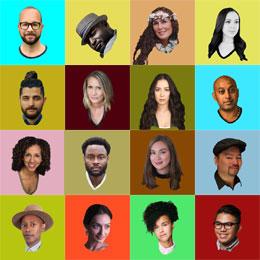Adding colour to Hollywood North

By Fabian Dawson
New Canadian Media
Growing up in Vancouver in the early 80’s as a mixed race kid with a black mother and white father, was not easy for Jason Mackay.
“I remember on many occasions hearing the word ni**er and told to ‘go back to where we came from’.. I’m quite light skinned so perhaps it was my little afro that set them off,” said Mackay, the executive producer for the Kid Carson Morning Show on Z95.3FM in Vancouver.
To overcome the hate he encountered in his younger years, Mackay took to building connections with people of different backgrounds to come together and learn from each other.
“This approach stuck with me throughout my early adult life which led me to gain experience in putting together different projects while negotiating budgets, resources and services within the marketing and advertising industry for the past 20 years,” said Mackay.
A few months ago Mackay reached into his past to create a new platform for Black, Indigenous and People of Colour (BIPOC) in Vancouver, dubbed Hollywood North.
Called the Collective Bunch, Mackay’s venture is primarily an industry-wide roster of culturally diverse professionals working in screen-based industries that is being made available for Canadian and American productions and media companies to hire.
“I’ve always been acutely aware of how advertising and movies can be very stereotypical in the roles they cast and when I eventually became involved in the industry as a partner in a production company, I noticed how the film crews were not diverse at all, Mackay said.
“It’s time to change that narrative.
“Not only does more diversity and inclusivity contribute to a more aligned society, but there is also a strong business case for it as it allows companies to target new populations and increase response rates with relatable messaging, helping boost their bottom line.
“My personal mission is to showcase all the diverse talent in the film and creative industry in Vancouver, help support each other and drive business to everyone involved.
While there are already similar initiatives in Toronto like Reelworld, the Indigenous Screen Office, and Black Women in Film, there is nothing here on the West Coast and this is why I'm making Collective Bunch Vancouver focused,” said Mackay.
Sharad Khare , a Vancouver-based digital storyteller and legacy documentarian is among the 50 people who have joined the Collective Bunch so far.
“The Collective Bunch is a symbol for inclusivity in an industry shaped by diverse cultures,” Khare.
“As a producer, content creator, and storyteller, I am truly influenced by the perspectives of many narratives,” he said.
D.I.Lee. the publisher of Korean News in Metro Vancouver and producer of KNTV for Shaw said the Collective Bunch initiative will help him showcase talent from the region’s Korean-Canadian community.
“Much of the recent efforts for inclusion and diversity in film have been targeted at on-screen representation…but behind the camera, in the studio and in crewing, it is still a very white business,” said Lee.
“Collective Bunch is a great way to increase diversity not only on screen but behind the screen,” he said.
Jamal Abdourahman, founder of Vancouver Fashion Week, which just concluded its 21st year said the Collective Bunch is a prime digital destination for New Canadians interested in working in BC’s film industry.
“It has great potential for delivering on-screen and off screen opportunities for New Canadians,” he said.
According to the Motion Picture Association of Canada, more than 180,900 people—from special effects technicians to make-up artists and sound editors— worked in the industry last year, which generated $12.8 billion for the Canadian economy.
Mackay’s initiative is gaining traction with new members joining every week, as BC’s film industry, hit hard by COVID-19, is bouncing back.
There were about 40 productions in BC, when it was ordered shutdown. Today there are about 60 productions either currently filming or in pre-production, according to the Vancouver Film Commission, which estimates the industry spent about $4 billion spent locally in 2019.
Nationally, the Canada Media Fund (CMF) earlier this month said it has doubled funding to $8 million to support screen-based creators, organizations and businesses from racialized communities, who have been impacted by the pandemic.
“We recognize many historically marginalized communities within the industry are disproportionately affected by the COVID-19 crisis and were not eligible for other CMF emergency relief funds,” said Valerie Creighton, President and CEO, CMF.
“Support to these organizations will help our industry become more inclusive and representative of all the talent Canada has to offer.”
Film & Television production
In Vancouver at a glance
Known worldwide for its 40 years of quality, creativity and innovation, Vancouver is the third largest Film & TV production centre in North America.
• Vancouver has a number of world class Film & TV studios located within its boundaries including: Mammoth, Vancouver, North Shore, Ironwood Studios, Canadian Motion Picture Park, and The Crossing Studios.
• On average the city is home to approximately 65+ movies and 55+ TV series annually, as well as hundreds of other filming days for commercials, TV pilots and other features.
• Direct spending on Film & TV production in British Columbia (BC) totalled more than $3.8 billion in 2017, making Vancouver the 3rd largest production centre in North America.
• The industry has a strong balance of international and domestic production activity, with foreign productions accounting for three-quarters of total production dollars spent in BC. Meanwhile, many home-based studios work with strategic foreign partners on co – productions with the mandate to make quality, commercially viable feature films and TV shows for a global marketplace.
• Access to experienced post-production facilities that serve the industry by providing colour correction, composing, sound and other services.
• Over 42,000 direct and indirect jobs are generated by Film & TV production in BC, with more than 80 per cent located in Metro Vancouver.
– Source Vancouver Economic Commission









